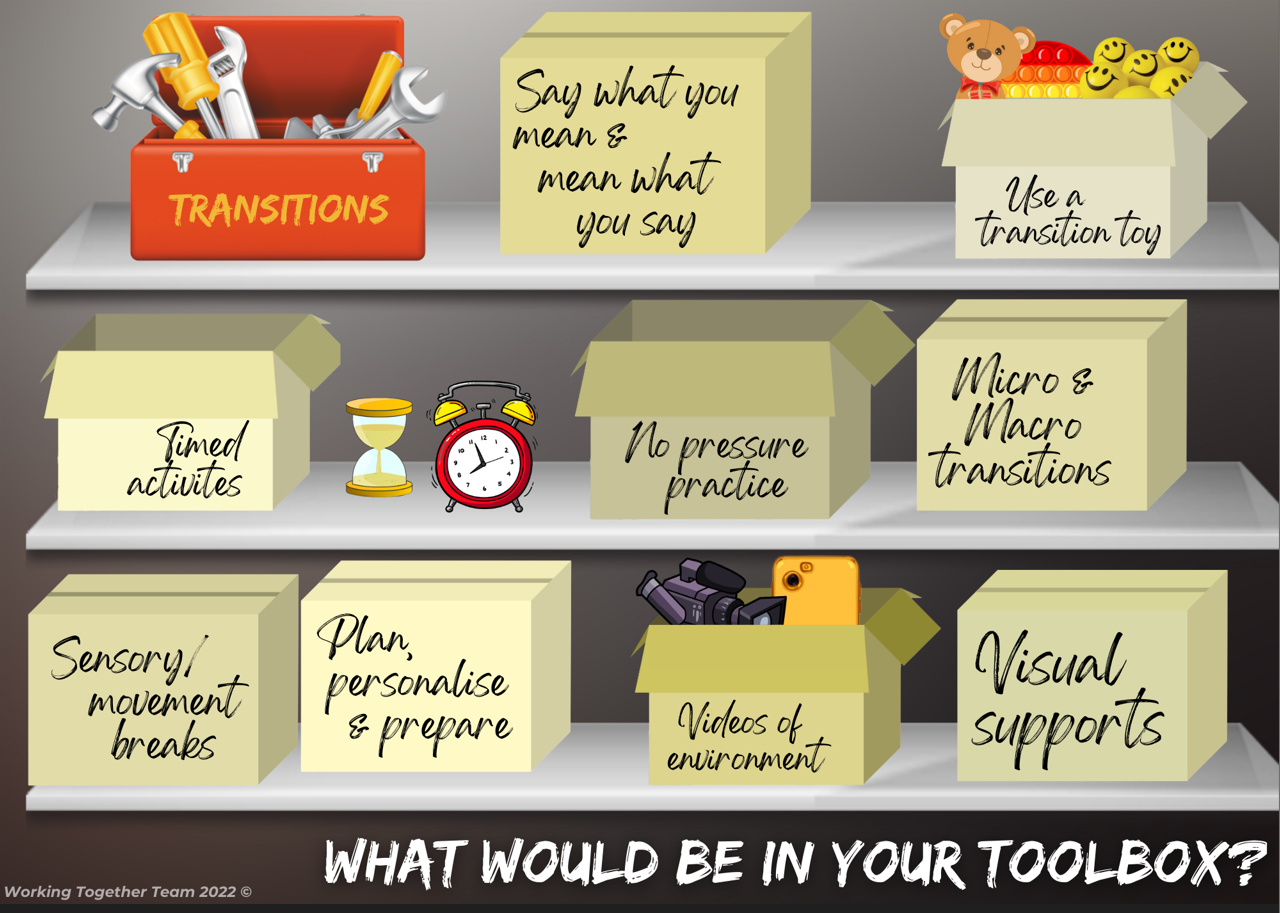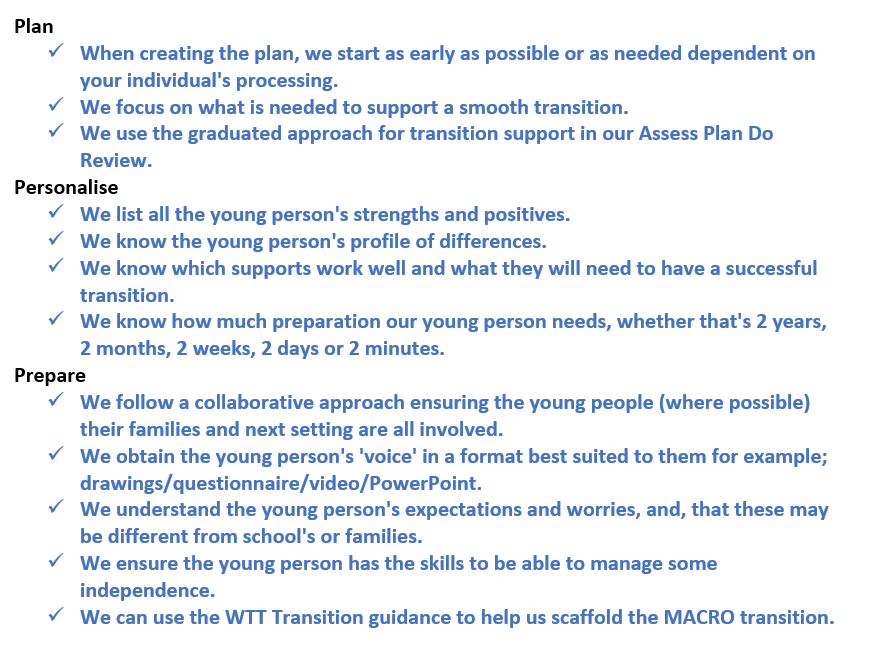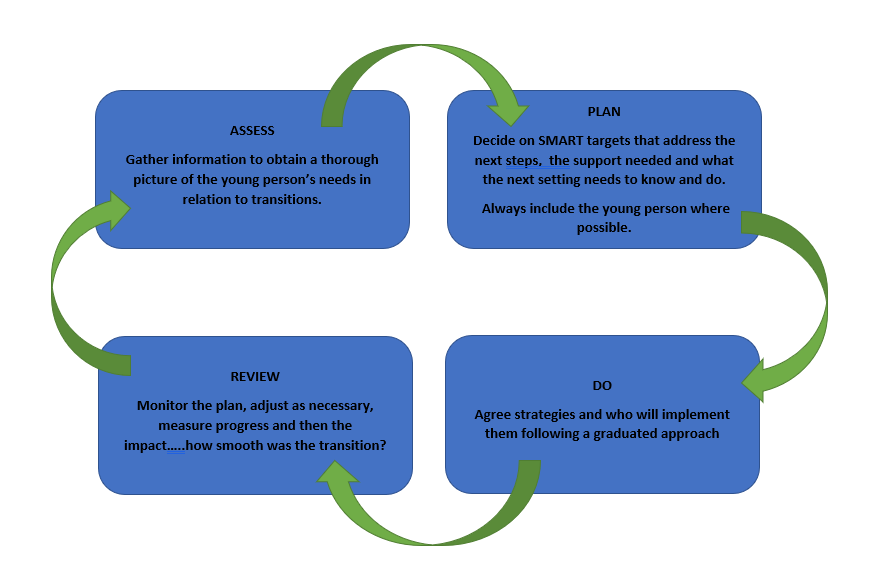TRANSITIONS
What do we mean by 'transitions?'
Any change of activity or environments such as between home and school, visiting relatives/friends, going to the park, supermarket shopping, moving from one classroom to another, stopping one activity and starting another, means things change, you transition between each one. And even if you've managed a 'transition' previously there is no guarantee that events will be the same every time or that a learnt skill in one area can be transferred to another therefore you may find that your children/young people become more stressed or even anxious because they're unsure of what might happen and find it difficult to predict.
Any transition is seen as a 'process' and not a ‘one-off’ event therefore there is a before, during and after and we rely on having past experience, the abilities to predict what may happen and the skills needed to manage at any stage within the 'process.' As we experience things we learn more skills and store information because each activity/event/situation may be different and if we don't store enough information, or the 'right' information it may impact on a person’s ability to manage changes at any point.
Which transitions do we need to think about when supporting our autistic learners?
We have BIG (MACRO) transitions eg:
Home to Nursery
Nursery to Primary
Primary School to Secondary
Moving House or school
Changes within a family
Secondary to College or Sixth Form
College/Sixth Form to University
Starting a job
But it's not always the big transitions that might have the biggest impact, we need to be equally aware of the smaller (MICRO) transitions throughout the day, and sometimes the little ones can be more distressing.
Waking up and starting the morning routine
Moving from one task / activity to another
Leaving a task to find equipment and re-engaging with the task
From inside to outside
Moving from one class to another
Moving from one class to break time to back to class
Going to lunch, finishing lunch, going back to class
Change of teacher / support assistant / peer group
Non-uniform days / enrichment days / residential weeks / swimming/ PE
All transitions impact on emotions and behaviour. There is a reliance on self-regulation, so the ability to understand and manage your reactions to feelings and things happening around you, and then manage your behaviour. In addition, you also then need resilience, the capacity to recover quickly in any given situation.
Autistic individual's can find understanding and managing their emotions difficult. They may be trying to cope with multiple messages e.g. sensory input, communication or filtering information. Quite often the behaviours you'll see are the automatic Flight, Fight, Freeze, Shutdown, Meltdown response. At this point they are filled to capacity, so it may take longer to recover.
For any transitions we need to consider the young person's key areas of difference, the environment, any additional structure needed through visuals and key information and give choices.
- Sensory and the environment - assessments, questionnaires, personalised sensory supports.
- Visual timetables/schedules - these need to be consistently and actively used. Once tasks are completed remember to remove it then the focus is on the next one eg First and Then or Now and Next visuals to prepare for upcoming transitions.
- A social story to describe the transition and expectations within that process-with visuals to support processing.
- Backward chaining-the child does the last part of a sequence to complete it, eg getting dressed, and gradually works back to the beginning with visual supports.
Think about:
Which tasks do they currently require additional support to complete?
What is the nature of support you currently provide?
Which skills are required to complete these expectations and/or access the support you provide?
Which areas of difference need enhanced support for transitioning?
What's in their Toolbox?!

For any transitions - Remember the 3 P’s
Plan, Personalise and Prepare
Depending on whichever you're planning for whether it's a MACRO or a MICRO transition the key is in knowing and understanding your individual's strengths, what they do well and what their motivation is.
When making those big transitions such as moving up to secondary school we can:


